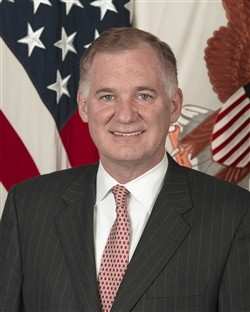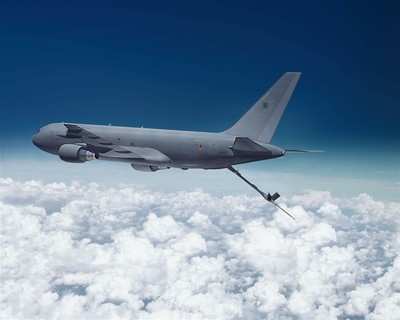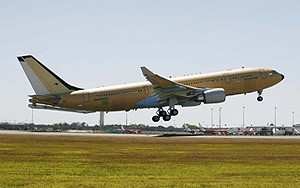372 Mandatory Requirements And 230 Technical Changes In Final
RFP
The final request for proposals to solicit bids for a new aerial
tanker was designed to promote fair, open competition that provides
the best warfighting capability for the best value, Deputy Defense
Secretary William J. Lynn III (pictured, below) said Wednesday
in Washington D.C. Meanwhile, the process will serve as a
model for the Defense Department's acquisition reform effort, Lynn
said, eliminating requirements added after the contract award that
drive up costs and delay delivery.

Lynn joined Air Force Secretary Michael B. Donley and Ashton
Carter, undersecretary of defense for acquisition, technology and
logistics, in unveiling details of the solicitation for a new KC-X
aerial tanker. The new tanker will replace the Air Force's aging
KC-135 Stratotanker fleet that refuels other aircraft in flight to
extend their reach and warfighting capability.
The highly detailed request for proposals released today --
which includes 372 mandatory requirements and incorporates 230
mostly technical changes in response to comments on a draft
document issued in September stays true to three guiding
principles, Lynn told reporters.
"This is going to be an objective completion. It is going to be
fair, it is going to be open," he said, recognizing the high stakes
in the determination in terms of jobs as well as revenues and
"buffeting" from both primary competitors, Boeing Co. and Northrop
Grumman Corp.
"We are resisting that buffeting, and we are going to play this
straight down the middle," Lynn said.

Boeing KC767 Tanker
The Defense Department has rejected going for a low-bid contract
in favor of a "best-value competition" that considers other factors
as well, the warfighting contribution and lifecycle costs among
them. "Price is very important," Lynn emphasized, but will be
weighed along with other variables during the selection process.
"The reason you can be sure this is not a price shootout is it is
actually possible to have a higher price and to win this
competition," he said.
Lynn expressed hope that the tanker selection process will serve
as a flagship for the department's broad acquisition reform
agenda.
It's highly detailed with 10 times the mandatory requirements
that were in the last bid proposal that was withdrawn almost
immediately after being issued. Laying out all the requirements up
front rather than tacking them on midstream, Lynn said, will guard
against cost overruns and program delays.
The Air Force's solid understanding of its requirements, along
with the maturity of the technology involved and the contractors'
well-established industrial bases set the stage for what Lynn
called another major acquisition reform initiative: fixed-price
contracts. "We can't do fixed-price development in every case,"
Lynn said, but he called the tanker solicitation the perfect
opportunity do so.
Incorporating technical changes in response to 350 comments on
the draft request for proposals, the final solicitation maintains
the focus on providing critical military capability, Lynn said.
"Where we haven't changed things is in the basic requirements of
the airplane," he said. "The warfighter has set out what they need.
We think the 372 requirements that we've laid out will bring the
Air Force the plane it needs to bring to the war fight on Day One."
Ultimately, "this is about what the Air Mobility Command needs to
meet the warfighting needs of the nation," Lynn said. "We think
that the structure in this RFP is going to get us that, and we're
going to proceed in that direction."
The contractors vying for the contract, worth an estimated $35
billion, will have 75 days to submit their bids. The Defense
Department will evaluate the proposals for 120 days, then the Air
Force will award a contract in the mid-September timeframe, Lynn
said. He expressed hope for a "robust competition" that delivers
"the best value for the taxpayer and the best airplane for the
warfighter."
Donley (pictured, below) echoed that sentiment, expressing
hope that both Boeing and Northrop Grumman will bid on what he
called "a very strong RFP." "We believe that both offerors are in a
position to win this competition," Donely said. "We think both
offerors can meet the mandatory requirements that we have laid out.
And we hope and expect to have a good competition."

Regardless of which contractor wins the contract, Carter said,
the "clarity and precision" used in the solicitation will leave no
one wondering how the decision was made. "The source selection
strategy is crystal clear," he said. "Everybody will know, when a
winner is picked, exactly why they won. And up front, both offerors
know exactly what they need to do to win."
Officials are hopeful this will eliminate the challenges and
acrimony that have plagued the aerial tanker process to date.
The Air Force initially awarded the contract to build up to 179
new KC-45A tankers over the next decade to a consortium of Northrop
Grumman and European Aeronautic Defense and Space Co., the parent
company of Airbus. The award drew a protest from rival Boeing.
General Accounting Office auditors upheld the protest, identifying
irregularities in the awarding of the contract.

Airbus A330 Tanker
The Air Force reopened the bidding process for the tanker
contract in July 2008, but Gates announced two months later that he
had decided to cancel it for fear it could not be awarded before he
planned to leave his post along with the Bush administration.
"It has now become clear that the solicitation and award process
cannot be accomplished by January [2009]," he said in testimony
before the House Armed Services Committee. "Thus, I believe that
rather than handing the next administration an incomplete and
possibly contested process, we should cleanly defer this
procurement to the next team."
Still serving as defense secretary as part of the Obama
administration, Gates is leading the team that will oversee the new
tanker acquisition.
 ANN's Daily Aero-Linx (04.16.24)
ANN's Daily Aero-Linx (04.16.24) Aero-News: Quote of the Day (04.16.24)
Aero-News: Quote of the Day (04.16.24) Airborne 04.10.24: SnF24!, A50 Heritage Reveal, HeliCycle!, Montaer MC-01
Airborne 04.10.24: SnF24!, A50 Heritage Reveal, HeliCycle!, Montaer MC-01 Airborne 04.12.24: SnF24!, G100UL Is Here, Holy Micro, Plane Tags
Airborne 04.12.24: SnF24!, G100UL Is Here, Holy Micro, Plane Tags Airborne-Flight Training 04.17.24: Feds Need Controllers, Spirit Delay, Redbird
Airborne-Flight Training 04.17.24: Feds Need Controllers, Spirit Delay, Redbird






